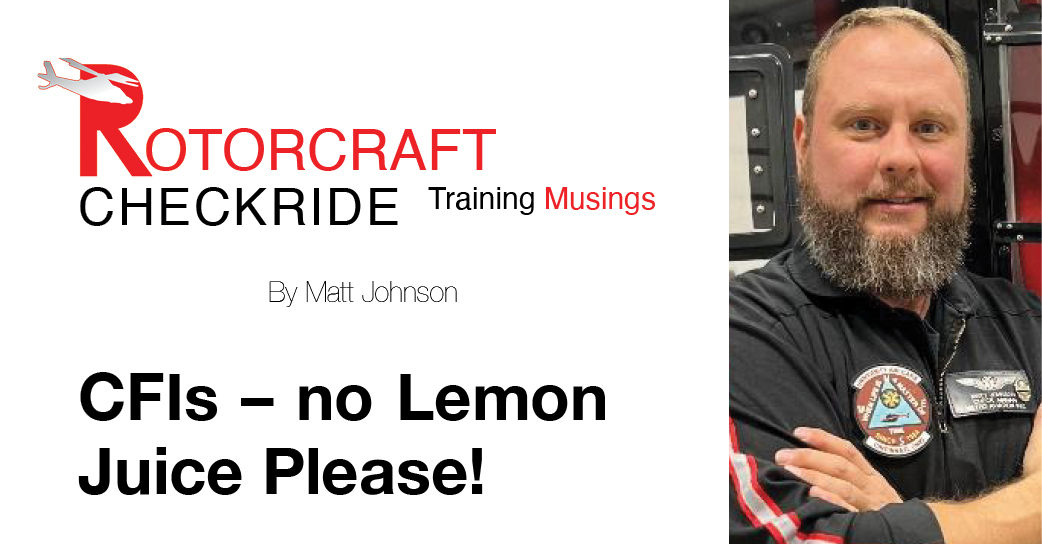|
Dec
18
2023
|
|
Posted 2 years 70 days ago ago by Admin
|
|

The CFI exam is one of my most enjoyable flight exams to administer. Yes, it is a long one! I get it; I, too, remember what seemed like the longest day of my life, starting with a few hours of discussing the FAAs Fundamentals of Instructing (FOI) concepts and then several deep dives on concepts related to our unique skill set. The proverbial light at the end of the tunnel of seeing a passionate applicant achieve that level of success is very rewarding.
I think we have all heard the aviation cliché that the private pilot certificate is the "license to learn," and I don't disagree; however, subjectively speaking, I believe the CFI Certificate is the true "license" to learn as you will find that you often don't truly understand things until you try to teach it to another person. I am often reminded of this philosophy as I reflect on one of the many famous quotes from notable theoretical physicist, Richard Feynman, who once said, "If you want to master something, teach it."
As a CFI, you need to be aware of various cognitive biases that can affect your students and yourself, sometimes with dire consequences.
Bank Robbers and CFIs?
As you scratch your head and wonder how these two compare, stay with me!
The amount of scholarly research on the study of cognitive biases is plentiful. Additionally, there’s just as many reasons for cognitive bias, ranging from the various motivations of each individual to limits on the mind's attention, etc. However, there is one cognitive bias that should resonate with CFIs and pilots of all levels of experience alike. It’s not recognizing your incompetence and how it can lead to an inflated self-assessment of your abilities. Said another way "You don't know what you don't know," and sometimes, knowing just a little bit can be as dangerous as knowing nothing about a particular subject.
This is where I want to give a vivid example. In January 1995, two men walked into a bank. While one waited in line as a "look-out," the other pointed a handgun at the teller demanding money. Neither robber wore any sort of mask nor disguise. Instead, they had applied Lemon Juice to their face. One of the robbers had previously told the other that he would be invisible to security cameras by applying lemon juice to his face. It is believed this "little bit of knowledge" had come from the fact that one of the men had read about the" spy game" many of us have played with our children where you write a secret letter using lemon juice and then apply a heat source to read the "secret message."
As they were hauled off to jail, one of the men mumbled, "But I wore the juice." As asinine as it sounds, a little bit of knowledge proved incredibly disastrous for these men.
This story caught the attention of David Dunning, a professor of psychology at Cornell University. Dunning came to believe that "If Wheeler (the robber) was too stupid to be a bank robber, perhaps he was also too stupid to know that he was too stupid to be a bank robber”. Dunning was fascinated by this, and he and a graduate student, Justin Kruger, organized a research program that led to many findings that would shape many aspects of how we understand certain human behaviors. This effect, the now infamous "Dunning-Kruger effect," is common vocabulary in many fields.
The Dunning-Kruger effect occurs when people (a CFI or pilot of any level) wrongly overestimate their knowledge or skill set in a particular field. In their testing, Dunning and Kruger found that those who performed in the lower ranks of various tests actually rated their skills "far above average.” The research concluded, "Those with limited knowledge in a domain (aviation) suffer a dual burden: Not only do they reach mistaken conclusions and make regrettable errors, but their incompetence robs them of the ability to realize it."
If you are a CFI it is critical that you recognize it not only in your students, but in yourself as well. I recently watched an instrument-rating applicant in an aircraft with a functioning autopilot make the wrong choice of which mode to engage, resulting in a less-than-desirable aircraft state. In the debrief, it was learned that the applicant had just a "little bit of knowledge" on the system, but his instructor also admitted that he had minimal knowledge of the system and thought he knew enough to "make a few things work."
Both applicant and instructor learned from that incident. They got a bit of egg on their faces, but at least it wasn't lemon juice!
About the Author: Matt Johnson has been an FAA designated pilot examiner for over a decade, conducting exams ranging from Private to ATP and CFI. Additionally, he is a single-pilot IFR air medical captain and Part 135 instructor and check airman. He can be reached at [email protected] and via Twitter @HelicopterDPE
READ MORE ROTOR PRO: https://justhelicopters.com/Magazine
WATCH ROTOR PRO YOUTUBE CHANNEL: https://buff.ly/3Md0T3y
You can also find us on
Instagram - https://www.instagram.com/rotorpro1
Facebook - https://www.facebook.com/rotorpro1
Twitter - https://twitter.com/justhelicopters
LinkedIn - https://www.linkedin.com/company/rotorpro1